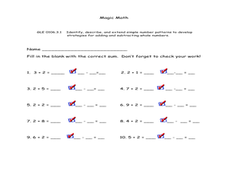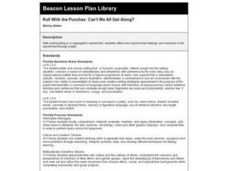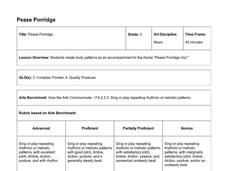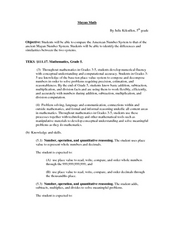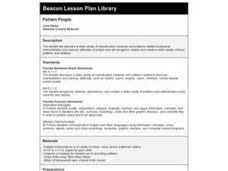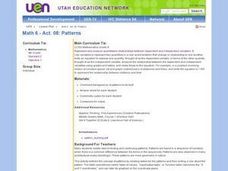Curated OER
Counting Patterns - Count Forward By Twos Up To 100
For this counting pattern worksheet, 2nd graders count forward by two's up to 100 in each of 3 tables. They fill in 18 boxes with numbers that complete the pattern.
Curated OER
Magic Math: sums of 2
For this addition worksheet, students add one digit numbers to the number 2 and check it with the subtraction fact. Students complete 10 problems.
Curated OER
The Sequences Problem
In this Algebra I/Geometry/Algebra II worksheet, students determine what term is missing in the two given sequences. The one page worksheet has two problems with the solutions.
Pennsylvania Department of Education
Dividing with Fractions
Fifth graders explore the strategies to solve word problems using multiplication and division. In this problem solving lesson, 5th graders recognize the relationship between multiplication and division to solve problems. Students view...
Curated OER
Patterns in Multiplication and Division
In this multiplication and division practice worksheet, students sharpen their problem solving skills as they use a multiplication table to solve 6 problems.
Curated OER
ROLL WITH THE PUNCHES: CAN'T WE ALL GET ALONG?
Students reflect and explore their feelings and reactions to a segregation experiment through poetry. They discuss acceptable behavior during the experiment and the next day write journal entries reflecting their experiences.
Curated OER
Skip Counting to Music
Your youngest mathematicians skip count by 2's, 5's, and 10's as they sing along to a Hap Palmer song that helps them remember the patterns. Students practice in whole group and then individually with the worksheet provided, using the...
Hawaiʻi State Department of Education
Pease Porridge
Practice using different ways to express a single pattern. The class uses concrete, pictorial, and numerical modes to represent patterns found in a simple rhyme. They will move their bodies, use body percussion, draw, and use numbers to...
Curated OER
Mayan Math
Fifth graders investigate the Maya's as mathematicians. In this Mayan math lessons, 5th graders work with the ancient Mayan numbering system by comparing it to the American Number System. They tell the differences and similarities...
Curated OER
Box Plots
Young statisticians are introduced to box plots and quartiles. They use an activity and discussion with supplemental exercises to help them explore how data can be graphically represented.
Curated OER
Introduction to Statistics: Mean, Median, and Mode
Students explore the concepts of mean, median, and mode. They develop an understanding and familiarity with these concepts. Students explore mean and median in an efficient way. Students explore three different measures of center.
Curated OER
Identifying Terms, Factors, and Coefficients
What are terms, factors, and coefficients? This slideshow provides definitions and examples of various parts of algebraic expressions, and provides guided practice problems in writing and identifying parts of algebraic expressions for...
Syracuse City School District
Reading Comprehension Unit Plan
A unit plan uses short texts to teach literary elements such as theme and characterization. Included are passages by authors such as Walter Dean Myers and Sandra Cisneros. Activities include quick writes, filling in graphic organizers,...
Curated OER
Periodic Table Patterns using Fabulous Periodic
Students explain how elements are arranged in the periodic table. In this chemistry lesson, students group the eggs according to a certain pattern. They compare this to elements in the periodic table.
Curated OER
Pattern People
Students describe a wide variety of classification schemes and patterns related to physical characteristics and sensory attributes of people. They recognize, extend and create a wide variety of those patterns and relations.
Curated OER
Tony Bennett: With Special Guests The Backstreet Boys - Lesson 2
Students clap four-beat rhythm patterns containing whole, half, dotted half, quarter, and eighth notes and rests in a given tempo. They clap the tempo as their teacher holds up flash cards.
Curated OER
the Squares of Numbers in Multiplication
Students memorize the multiplication math facts and learn many different ways of visualizing and practicing the multiplication concepts. They begin practicing with arrays, skip counting, and moving manipulatives for the 0, 1, 2, 3, and 4.
Curated OER
Math 6 - Act. 08: Patterns
Sixth graders use centimeter cubes to build structures and then compare and contrast the patterns they see.
Curated OER
Mathematics Within: Algebraic Patterns
Students discover patterns in linear equations by playing a dice game to collect data. They graph the data and analyze the patterns of the lines created by the data. The class then compares the individual graphs to evaluate the position...
Curated OER
Design Your Own Quilt Pattern
Young scholars apply what they have learned, from Eight Hands Round a Patchwork Alphabet, about how quilt blocks got their names by constructing and naming a quilt block pattern of their own using pattern blocks and pattern block paper.
Curated OER
Adding Decimals with Hundredths
In this worksheet, students learn to add decimal numbers to the hundredths. Students first compare adding and subtracting decimals with the corresponding fractions in 6 problems. Then students add 35 decimal numbers mentally, filling out...
Curated OER
Number Chart 13: Skip Counting by 9
In this skip counting instructional activity, 4th graders fill in the numbers to complete a pattern of skip counting by 9. Students begin with the number 5 and write the numbers as they skip count to 500.
Curated OER
People, Not Numbers: Bringing 12 Million into Personal Ter
Young scholars forge a compassionate link to the large numbers of people who were the victims of slavery as opposed to thinking of them simply in terms of numbers. They perform a math exercise to put the number of people in slavery into...
Curated OER
Patterns
In this college level algebra worksheet, students examine patterns, formulas that describe the pattern and determine the sum of an infinite pattern. The one page worksheet contains five questions. Answers are provided.



